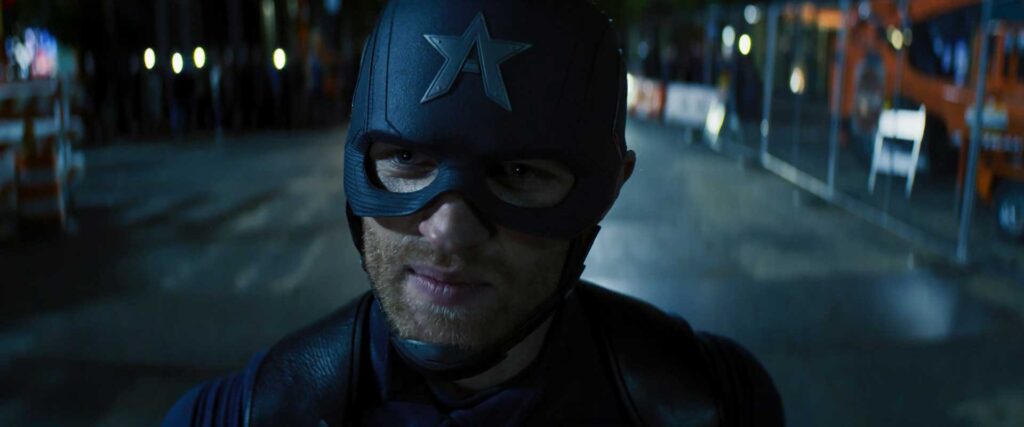Marvel concluded its run of The Falcon and the Winter Soldier with a high-octane spectacle-laden episode that brought the fight to New York. Sam Wilson finally embraced the responsibility of Captain America and should be the iconic hero for the next generation. The episode is essentially structured in three different acts: the action, the speech and the setups.
Most of the first half is taken up by a climax of MCU movie proportions as Wilson and Bucky team up to stop Karli Morgenthau from inflicting damage upon members of the Global Repatriation Council. As thrilling as it is to watch the action beats from your small screen, it also devolves into standard MCU fare with what seem like incredibly low or fake stakes as Wilson spends most of his time rescuing a bunch of council members we’ve only just met and don’t care much about. The quick cuts continue, especially in Sam’s helicopter rescue and it chips off the polish and finesse of some of the better compiled movie counterpart sequences.
The Flag Smashers are completely delegated to being routine villains after some efforts were made to get us to see Karli’s side of things. In an episode as heavily focused on the action, this was to be expected. By the time Karli is dispensed, all our feelings of remorse have fallen by the wayside and we’re only looking forward to the next major development. It’s a shame because Erin Kellyman imbued Karli with a sense of humanity that helped empathize her with viewers only to be undone by the slipshod and quick writing.
We’ve come to expect twists in an MCU property by now and we get a much forced one when Sharon Carter turns out to be the real big bad orchestrating Karli’s exit from Madripoor. She’s revealed to be the Power Broker all along and is even set up as a potential recurring bad for future MCU appearances. While her descent is understandable at some level after seeing it as vengeance for her country betraying her and banishing her to Madripoor all this while, it’s still a very inorganic plot development that pops out of nowhere and even seems contrary to Sharon’s personality. Seeing as she fought side-by-side with the original Cap, would she go as far as to betray the new one?
Our new Cap meanwhile gets the stage to deliver a rousing speech about the importance and significance of a black man donning the mantle of Captain America. In a sequence sure to stir up inspiration, Wilson talks about the systemic racism that the blacks have endured and wows to put a stop to this by accepting his responsibility as the superhero America won’t let him be. The only problem is, the scene runs far too longer than it should have. A bit shorter and its impact wouldn’t have been as lessened as it feels right now. It’s undeniably a huge moment for people of color but we’ve had much bigger moments when Black Panther was released.
All of this concludes with the now familiar setups. What good is a Marvel property if it doesn’t leave us hanging in excitement for the path ahead. The title card reveal of Captain America and the Winter Soldier is exciting and fitting, confirming fan predictions even if a bit repetitive given that we had a similarly named movie. The most emotional is Wilson commissioning a memorial for Isaiah Bradley to reinstate his place in history; it’s silent, poignant and hits the right notes. Sharon Carter’s aforementioned turn to the dark side is also glimpsed as she pledges to release government secrets.
Perhaps the most bizarre development occurs with John Walker. Where the public and our heroes were staring in shock at the murder he committed with his shield, Walker is seen casually chatting with our heroes and exchanging quips as if he’s naturally a part of the team now, and even gets a shot at redemption as he saves a van filled with GRC members. It yet again reeks of a tonal imbalance, something that the series has struggled with, jumping from one plot development to the next. Walker’s brush with darkness is almost forgotten as he gets ready to become US Agent Walker from the comics. And Julia Louis-Dreyfus’ game is still unclear although that’s a tease I can forgive seeing how Marvel likes to play the long game.
Overall then, the episode had its moments and an inspiring speech from Sam Wilson but it also had quite a lot of slip-ups. Things didn’t add up or mesh as well as one would expect and One World, One People lacked a certain cohesiveness compared to some of the show’s more refined episodes. The twists were out of line and betrayed our characters and Karli got a less than worthy send off. Even Zemo dispensing off the last of the bunch from behind bars was a plot convenience. Regardless, it was enjoyable and the regrets stem more from the prospect of imagining what it could have been and meant.






